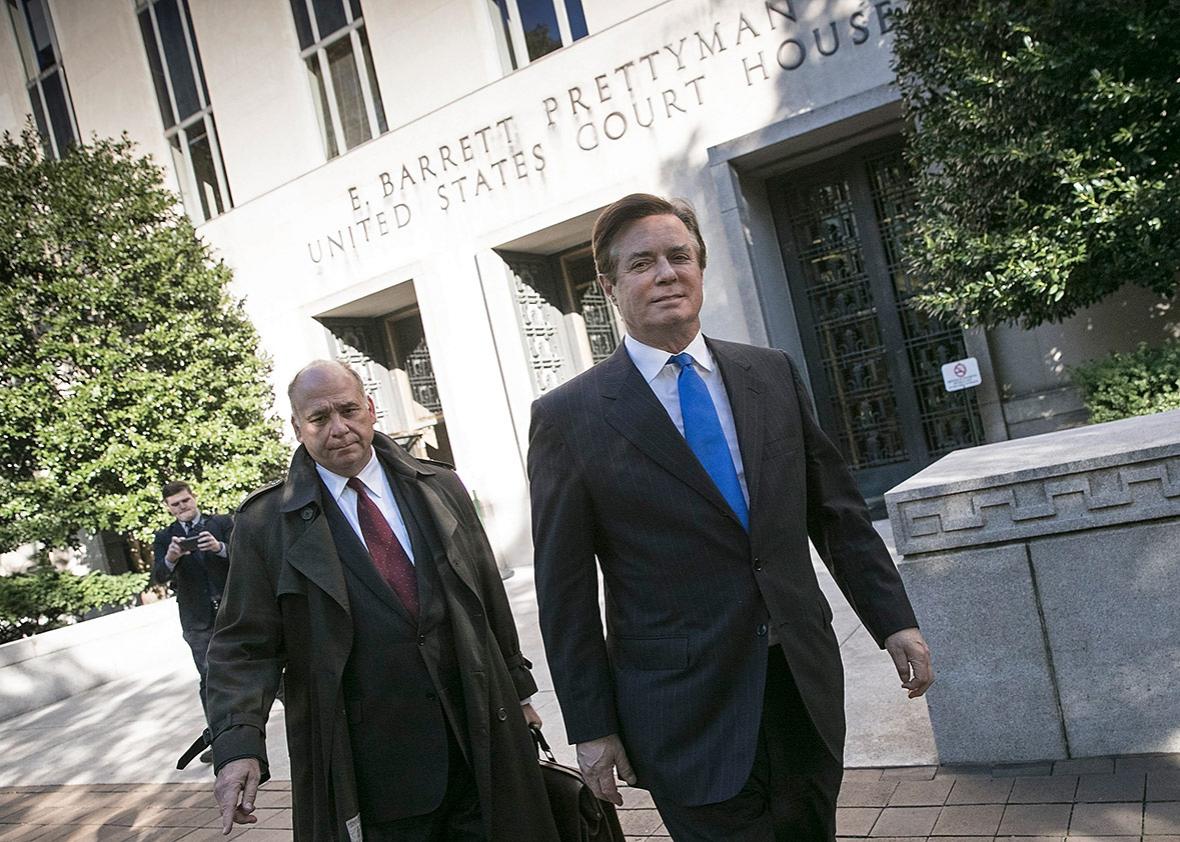In presidential scandals, there’s a classic distinction between the crime and the cover-up. That rule has generally been applied to the Trump–Russia affair: Collusion is one question; obstruction of the investigations is another. But that distinction may be blurring. A stipulation agreement released Monday, as part of a plea deal between special counsel Robert Mueller and Trump foreign policy adviser George Papadopoulos, suggests that the Trump campaign wasn’t just engaged in contacts with Russia during the 2016 campaign. It was trying to hide those contacts from scrutiny.
The stipulation describes an email from Papadopoulos to a senior Trump campaign policy adviser on or around April 25, 2016. By that point, Papadapoulos had been serving on Trump’s foreign policy council for more than a month. In the note, Papadopoulos told the adviser that “the Russian government has an open invitation by Putin for Mr. Trump to meet him.” He suggested that Trump and Putin meet in London. Such a meeting would of course become public. But the contents of the meeting, Papadopoulos noted, might not. “The advantage of being in London,” he wrote, “is that these governments tend to speak a bit more openly in ‘neutral’ cities.”
Four weeks later, on May 21, Papadopoulos emailed Paul Manafort, who was then Trump’s campaign chairman (and has now been indicted on tax fraud charges), to reiterate that Russia’s Ministry of Foreign Affairs was “eager to meet Mr. Trump.” Manafort forwarded the email to another Trump campaign official, Rick Gates (who has since been indicted alongside Manafort), with a note attached. “Let’s discuss,” said the note. “We need someone to communicate that DT is not doing these trips. It should be someone low level in the campaign so as not to send any signal.”
What signal was Manafort trying to avoid? The charitable theory is that he didn’t want to convey disrespect to Russia by having a senior campaign aide explicitly reject Russia’s outreach. That’s implausible, since assigning the brushoff to a junior aide conveyed even less respect. Nor would that theory explain why, when the email chain was leaked and published in the Washington Post two months ago, the part about avoiding a “signal” was left out. It’s more plausible that Manafort was trying not to alert nosy Americans—perhaps the same ones who, on behalf of our government, might have monitored a Trump–Putin meeting more easily in the United States than in London. That would explain why, once the Russia scandal exploded, the sentence about a “signal”—indicating an attempt to keep contacts between Russia and the campaign secret—was omitted from the material given to, or at least published by, the Post.
On June 19, 2016, Papadopoulos wrote to a high-ranking Trump official—apparently Manafort again—this time passing along word from the Russian foreign affairs ministry that if Trump couldn’t travel for a meeting, Russia would like to meet with a representative from Trump’s campaign. “I am willing to make the trip off the record,” Papadopoulos wrote, “if it’s in the interest of Mr. Trump and the campaign to meet specific people.” According to the stipulation, this offer led to weeks of communication about possible off-the-record meetings. On Aug. 15, a campaign supervisor wrote back to Papadopoulos, telling him “I would encourage you” to “make the trip.” The trip never happened. But the campaign’s authorization of an off-the-record meeting did.
The juiciest disclosure in the stipulation involves a breakfast in London on April 26, 2016, a day after Papadopoulos sent his initial query about a Trump–Putin meeting in London. At the breakfast, an “overseas professor” told Papadopoulos “that he had just returned from a trip to Moscow where he had met with high-level Russian government officials” and had “learned that the Russians had obtained ‘dirt’ on then-candidate [Hillary] Clinton.” Specifically, the Russians had “thousands of emails” from or about Clinton. But the stipulation says nothing about Papadopoulos passing this information to the Trump campaign. It says he “continued to correspond with Campaign officials” and his Russian contacts. But the correspondence spoke only of working “to arrange a meeting between the Campaign and the Russian government.”
This is quite puzzling. We know that the Trump campaign wanted dirt on Clinton. That’s clear from email correspondence leading up to the June 9, 2016, meeting between Manafort, Donald Trump Jr., Jared Kushner, and Russian representatives. Why, then, didn’t the campaign follow up on the April 26 offer? The answer is we don’t know that it didn’t. All we know is that the campaign’s correspondence after April 26 didn’t mention dirt or Clinton’s emails. Maybe Papadopoulos didn’t pass the information along. Or maybe he did, and the vague record that follows is what happens when an incriminating conversation goes offline.
Consider, for example, a phone call between Papadopoulos and another campaign official on May 5, 2016. The only reason we learn of that call in the stipulation is that subsequent correspondence alluded to it. Phone calls that went unmentioned in emails may, to this day, remain undetected. Disjunctions in the record, such as the April 26 “dirt” alert that mysteriously went nowhere, are often a sign of successful concealment.
The cover-up goes on. At Monday’s White House briefing, press secretary Sarah Huckabee Sanders dismissed Papadopoulos as a freelancer. “No activity was ever done in an official capacity on behalf of the campaign,” Sanders insisted. “Any actions that he took would have been on his own.” Use a cutout, then disown him: That’s classic spycraft. The “on his own” defense doesn’t square with all the correspondence between Papadopoulos and higher-ups in the campaign. But it does indicate that he was well-positioned, if not well-placed, to provide the campaign with plausible deniability.
Did the Trump campaign collude with Russia? That question looks more and more like the question of whether Bill Clinton had sex with Monica Lewinsky: It happened, and now we’re just debating the meaning of “collusion.” But the documents released Monday tell us more. The cover-up didn’t begin when the collusion ended: It was going on all along.
